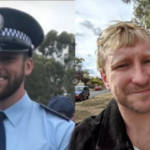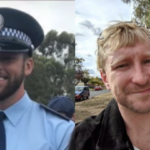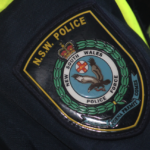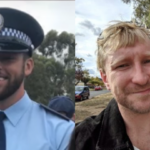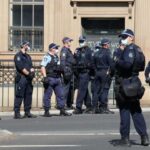Luke Moore Secures Hatrick of Successfully Suing Police
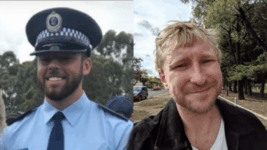
Luke Brett Moore, law graduate and strip search activist, was awarded $450,000 in respect of a civil suit against the state of NSW for malicious prosecution on 12 September 2025, after NSW police constable Daniel Keneally, the son of former NSW premier Kristina Keneally, provided a detailed false statement incriminating the Nowra man, which saw him held in solitary confinement for 3 weeks.
Moore spent 22 days all up in the South Coast Correctional Centre, after he rang Newtown police station to complain about the NSW Police Force strip search policy in February 2021, and he got Keneally on the other end. Kenneally then falsely claimed Moore had threatened to kill a Goulburn detective, and members of the Fixated Persons Investigation Unit arrested him the next day.
Kenneally was later convicted of fabricating evidence, contrary to section 317 of the Crimes Act 1900 (NSW), which carries up to 10 years prison time. He was then sentenced to a 15 month intensive correction order in February 2024, and he went on to lose an appeal against his conviction, as NSW District Court Judge John Pickering found any annoyance he felt didn’t warrant the false statements.
NSW Supreme Court Justice Richard Cavanagh noted that Moore had been harassed by police for 10 years. His Honour underscored that nothing the 38-year-old had said over the phone to Keneally could have been misconstrued as a threat of violence, and while what he’d said on the phone was filled with “scurrilous allegations”, it contained no threats of violence or to kill anyone.
The clincher to the false imprisonment and prolonged isolation saga was that the callous actions of the NSW police constable were foiled by the fact that Moore had recorded the conversation on his phone, so while he was stewing inside for over three weeks, he was aware that the evidence of his innocence was contained on his electronic device.
Blatant false imprisonment
Over false claims that he had threatened a Goulburn detective, the NSW Fixated Persons Investigation Unit turned up at Moore’s residence, which was then in the NSW Southern Tablelands town of Goulburn, and on arrest, he was charged with three criminal offences, including the federal crimes of using a carriage service to menace and using a carriage service to make a death threat.
The court heard during a lengthy hearing in May, that Keneally had set about concocting his false and specific statement soon after the 8.30 pm call. The constable searched Moore online and found that the law graduate had written scathing remarks about the Goulburn detective, however these did not comprise of death threats, and he didn’t even mention the man’s name during the call.
Moore told Sydney Criminal Lawyers in August last year that a detective Felgate had been placed in charge of his prosecution. During a police interview, Moore told the detective that he hadn’t said any of the threatening statements that Keneally had suggested, and in fact, there was a recording of the conversation on his phone to prove this, and Felgate then listened to it a few days later.
Moore was then released on bail. But as he recalled afterwards, this was not due to Felgate concluding he was innocent, as Moore alleges the officer did listen to the recording, yet then signed off on Kenneally’s version of events regardless, and he continued to prosecute. It was only when the Commonwealth Director of Public Prosecutions took over the case, that the charges were dropped.
Following the CDPP’s intervention in June 2021, nothing occurred in respect of Kenneally’s statement. However, he was arrested in October 2022, following the Law Enforcement Conduct Commission having presented an assessment to police earlier that year. The LECC then inquired further into the incident on Moore’s request and found serious misconduct had occurred.
The golden trifecta
Moore is no stranger to police harassment, Justice Cavanagh noted, on handing down his decision in respect of the civil lawsuit. Neither was it the first time that Moore had successfully sued the police. In fact, Moore had already sued the NSW police on two prior occasions, one of which related to his being stopped by police officers outside of the Hibernian Hotel in Goulburn in April 2017.
The officers on that occasion wanted to strip search Moore in their van, as they suspected him of being in possession of illegal drugs. But Moore refused, citing section 33 of the Law Enforcement (Powers and Responsibilities) Act 2002 (NSW), which stipulates that strip searches can only take place outside of police stations if “the seriousness and urgency of the circumstance” require it.
So, the police then arrested Moore and took him to the nearby police station for searching, as officers are permitted to strip search civilians at police stations when they “suspect on reasonable grounds” that such a search is necessary. However, the police found nothing on Moore, but they still charged him with hindering police, contrary to section 546C of the Crimes Act.
Following his conviction on hindering police, former NSW District Court Judge David Frearson overturned the charge on appeal. Indeed, the recent case involved Kenneally bringing the number of times that Moore has sued the NSW police to three in total. So, it would seem that Moore can now claim to have successfully pursued a ‘suing NSW police hat trick’.
During the second Sydney COVID-19 lockdown in September 2021, SCL spoke to Moore, who had just determined to sue the state in response constable Kenneally’s false statements, which would result in a suing police trifecta, and the Nowra man was further in the midst of establishing his legal service ISUEPOLICE.com, which serves to assist civilians who’ve been subjected to police misconduct.
A question of compensation
The Nelson Mandela Rules, or The United Nations Standard Minimum Rules for the Treatment of Prisoners recommends a 15 day limit should be placed on the use of prolonged solitary confinement, due to the serious impacts it can have on a person. The NSW Police Force subjected Moore to 22 days of the torturous practice, based on the falsehood that he had threatened to kill a cop.
Moore told the NSW Supreme Court in May that he hasn’t been working since the time of his false imprisonment, and he has “ongoing symptoms of anxiety, depression and symptoms which have led to a diagnosis of PTSD”. For the great upheaval that he was subjected to during his three weeks in prison for no real reason, Moore considered that he was warranted $3 million.
The NSW state argued that while Moore was due a compensation payout in respect of the behaviour of its former rogue officer, the respondent considered the amount that was owed to be much less than what the plaintiff was seeking. Justice Cavanagh agreed that damages were warranted, as he concluded the state “must have been well aware that he was… wrongfully incarcerated”.
His Honour found that the NSW police had failed to drop the charges against Moore for three months following Felgate having listened to the recording. Over that period that the charges remained, law enforcement was aware that it could not prosecute, and due to this, Moore was awarded $456,160 in compensation, and he ordered the state to pay the civilian’s legal fees.


